#birth rate
Text
I can't imagine anyone with a lick of sense looking around the USA in 2024 and saying "This would be a great time to start a family. Maybe the kids will get to enjoy a few years of underfunded public education in a fascist country before they get shot."
#birth rate#vote blue#vote biden#vote democrat#vote blue to save democracy#vote blue 2024#democracy#social democracy#democratic socialism#democrats now socialism later#biden/harris 2024#vote biden/harris
20 notes
·
View notes
Photo
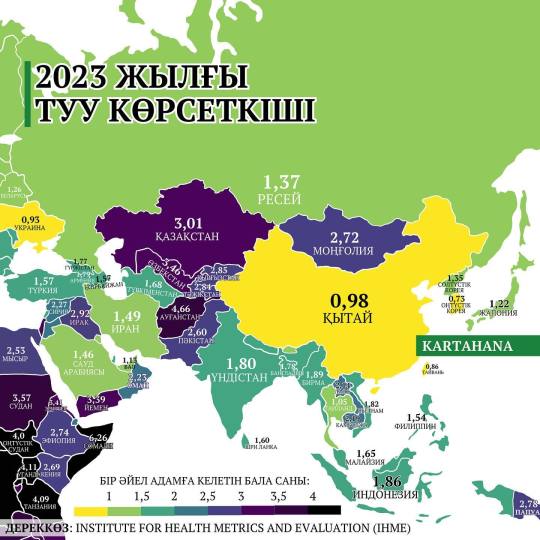
Birth rate in Asia, 2023
by kartahana
49 notes
·
View notes
Text
I'm always so fascinated by how small Palestine is. There's only 4.9 million of them in the country. The global diaspora compromise about 6 million though. It's insane that more than half its population is displaced and barred from coming home.
Israel has a population of 9.3 million, grown over 75 years of genocide, luring in settlers, and sucking on the imperial teat. They're still always so hilariously mad at Palestinians for having large families. "How can we be doing a genocide when they keep having. So. Many. Fucking. Brats??" Ostensibly because of the notion that it's the Israeli taxpayer that's supposed to support this ungrateful welfare state. Rhetoric straight out of an anti-Black fuck-them-poors Reagan dream.
Fecundity may be a deliberate way of resisting the entity hell-bent on wiping out their people. But it's also the result of factors that limit women's autonomy and sexual freedom, like poverty, reduced education infrastructure, high unemployment, religious fundamentalism, and urban and military violence. (Palestine used to be one of the most secular in the region and moved further towards religious conservativism with the escalation of Israeli terrorism.) Idk why fascists deliberately create these conditions then get mad when birth rates sky rocket.
Palestine's education system has done quite admirably though, considering it's had to struggle through Israel's chokehold. It's literacy rate is a very respectable 96.9%, tertiary education enrollment 45% and its rate of tertiary education for women one of the highest in the MENA region. The problem is women being barred from actually putting all that education to use, I'm guessing because of an economy perpetually in crisis, restricted freedom of movement, conservative gender bias and being expected to manage large families.
I can't even fathom how much more difficult things will be for Palestinians when Israel's finished with Gaza. All eleven universities have been bombed, all but a handful of hospitals still standing, along with libraries, schools, community centers, mosques, churches and targeted strikes systematically taking out the most distinguished academics, researchers, doctors, scientists, writers and artists— all its mentors and luminaries. Displacement is almost secondary to ensuring a complete cultural and epistemic genocide, that destroys not just immediate living conditions like water, food, fuel, power, shelter and medical treatment, but also all hope of emancipating and uplifting themselves through education and a knowledge economy.
#free palestine#gaza genocide#feminism#birth rate#population control#racism#apartheid#fuck israel#epistemic genocide#epistemic injustice#knee of huss
14 notes
·
View notes
Text
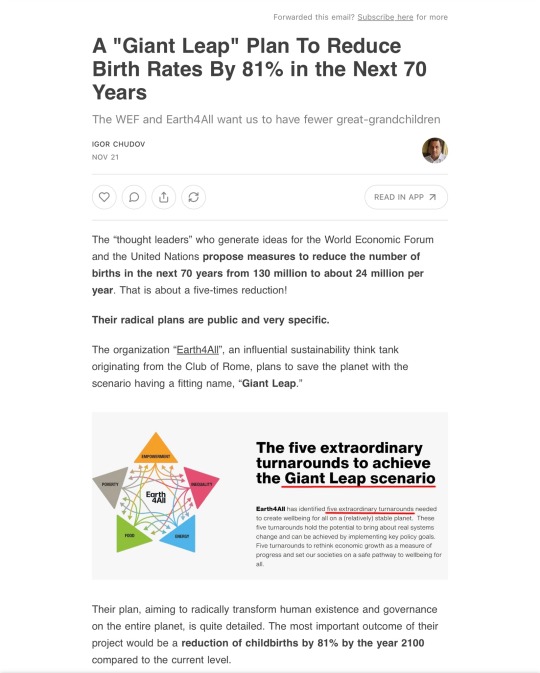
17 notes
·
View notes
Text
U.S. Birth Rates Fall to All Time Low
6 notes
·
View notes
Text
I’ve never felt more fertile watching spy x family
13 notes
·
View notes
Text
U.S. births fall

View On WordPress
2 notes
·
View notes
Text

"MIXED MARRIAGES IN ONTARIO MANY," Windsor Record. October 30, 1913. Page 1.
----
Toronto, Oct. 30. - That the Ne Temere decree is not working out to the absolute stoppage of mixed marriages is shown in the annual report of the registrar-general of the province issued today.
According to the figures, 820 men and 1,096 women married outside their faith.
The number of marriages totalled 28,445. Nearly two-thirds of those married were between 20 and 30 years of age. The unusual marriages included a man of 25, who married a woman over 70 and three women under 30 marrying men over 70.
The province showed a reduced death rate for the year, lower than in many other countries. On the other hand there is the announcement that one of every ten infants in Ontario dies before attaining the fifth year.
The birth-rate was 22.4 per thousand, the lowest since 1902. In 1911 it was 22.6.
Deaths numbered 32,150, or 12.4 per thousand, or 2 lower than in 1911. Illegitimate births showed an increase of 168. Seventy-two per cent. of these births were in cities.
The battle with the white plague showed good progress. There was a total of 2,250 deaths, but this was a decrease of 103 and a decrease in percentage of 05. About seven per cent. of the deaths in Ontario were from tuberculosis. The heaviest death rate from the disease is between 20 and 30 years of age.
One out of every ten infants die before its fifth year. There were 8,230 of such deaths, while 6,494 died before completing 12 months. Two hundred less died from diarr- hoea than in 1911, the lowest in six years.
This was attributed to the greater interest in child welfare and the successful efforts to educate young mo- thers in the care of children.
#toronto#ontario government#registrar general#mixed marriages#marriage law#regulation of marriage#christianity in canada#infant mortality#tuberculosis#birth rate#statscan#government statistics
2 notes
·
View notes
Photo
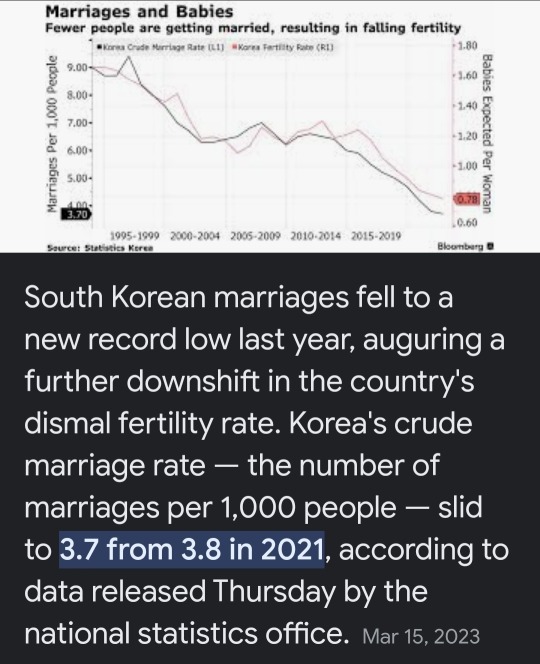
The marriage rate is definitely declining in Korea. By the way, just because they didn't get married and didn't register their marriage on the administration system, are they really living alone without a partner?
Korea is a society that cares extraordinarily about eyes of others. In traditional Korean way of thinking, they do not think about why they are doing something, but simply say, 'Other people do it, so I do it too'. But these days, it seems that there are more people who think, 'Why me?'
The essence of marriage is that two like-minded people live their lives together, and whether or not a wedding event is held has no effect on its essence. In an agrarian society or a feudal society where social life was possible only after receiving acceptance from the people around, weddings would be held for social purposes, but in today's society where people do not know even who lives next door, wedding celebrations have no real meaning other than 'social gatherings of extroverts' or 'religious celebrations of religious people'. Very introverts are reluctant to meet acquaintances, so it is not easy for them to welcome a wedding that is crowded with people they do not even know. Who would spend effort and money on an event they do not want and have no practical meaning or benefit?
Those who enjoy meeting people and holding magnificent events will continue to have weddings, and those who hate meeting people will not hold weddings. So, although the number of weddings event will decrease, as only those who are outgoing and like big events hold weddings, the scale of the event itself will become larger and more expensive in the future.
In the case of marriage registration, the automobile insurance premiums are reduced due to marriage registration, but in the case of youth loans, the amount of money that can be received is rather reduced. Even if you already live together, it is a reasonable way of thinking to register marriage if there is something beneficial to you and not to register if there is a loss. Administrative systems are all created for the convenience of people, and there is no need to use a system that is not beneficial to the individual.
In the case of childbirth, in the past, when the time came, everyone would have children, so you would have had them too, but this is not the case now. If you think your life needs life with children, you will have children, if you don't, you won't have children. The economic burdenis is a matter of the next rank. There are some people who come up with patriotism and national economic issues in relation to childbirth, where private life is at stake, and put forward the logic of 'Shouldn't you have children because the country is going to ruin due to low birth rates?' But, is it a normal way of thinking to give birth out of patriotism?
In the past, everyone went to college, so they went to college, others said it was better to stay at one full-time job for a long time, so they only looked for full-time jobs, others said they had to own a house, so they took out a loan to buy a house, and the pastors said they had to keep Sunday, so they went to church. This will not be the case in the future. Those who only believe, or want to believe, that the existing system will remain forever, there is a possibility that their livelihood is cut off.
한국에서는 확실히 혼인율이 줄어들고 있다. 그런데, 결혼식을 안 올리고, 구청에 혼인신고를 안 했다고 해서 정말 그들이 다들 짝도 없이 혼자 살고 있는 것일까?
한국은 지독히도 남들의 시선에 신경을 쓰는 나라이다. 뭔가 하면서도 그걸 왜 하는지를 스스로 생각해 보지 않고 그저 '남들이 다 하니까 나도 한다'는 게 고전적(?)인 한국인의 사고방식이다. 그런데 요즘 들어 '굳이 나까지 왜?'라는 생각을 하는 사람들이 생겨나고 있는 것 같다. 결혼의 본질은 마음이 맞는 두 사람이 같이 삶을 살아가는 것이고, 결혼식 이벤트를 하고 안 하고는 그 본질에 아무 영향을 미치지 않는다.
주변인들로부터 용인을 받아야만 사회생활이 가능하던 농경사회나 봉건주의 사회라면, 사회적인 목적으로라도 결혼식을 올리겠지만, 옆집에 누가 사는지도 모르고 사는 오늘날 사회에서의 결혼식은 '외향적인 사람들의 친목 모임'이나 '종교인들의 종교 이벤트' 외에는 아무런 실질적인 의미가 없다. 내향성이 강한 사람들은 지기가 아는 지인을 만나는 것도 꺼려하는데.. 알지도 못하는 사람들까지 우글우글 몰려오는 결혼식을 그들이 반기기는 쉽지 않다. 본인들이 원하지 않고, 실질적인 의미나 이득도 없는 행사를 노력과 돈을 들여가며 할 사람이 누가 있을까?
사람 만나서 이벤트 열기를 즐겨하는 사람은 앞으로도 계속 결혼식을 할 것이고, 사람 만나는 걸 싫어하는 사람은 결혼식을 안 하게 될 것이다. 그래서 결혼식을 올리는 숫자 자체는 줄어들겠지만, 외향적이고 큰 이벤트를 좋아하는 사람들만 결혼식을 올리게 되면서, 행사의 규모 자체는 앞으로 더욱 커지고, 비용도 더 많이 들게 될 것이다.
혼인신고의 경우에도, 자동차보험료 같은 경우에는 혼인신고로 인해 보험료가 줄어들지만, 청년 대출 같은 경우에는 오히려 받을 수 있는 돈이 줄어든다. 이미 같이 살고 있더라도, 본인들에게 이득이 되는 게 있으면 신고를 하고, 손해가 발생한다면 신고를 안 하는 게 합리적인 사고방식이다. 행정 제도라는 것들은 모두 사람의 편의를 위해서 만들어진 것인데, 혼인신고를 안 하는 게 불법인 아닌 이상, 본인들에게 이익이 되지 않는 제도까지 이용할 필요는 없다.
출산의 경우에는, 예전에는 때가 되면 다들 자식 낳고 사니까 본인도 낳았겠지만 지금은 그렇지 않다. 스스로 생각해서, 자녀가 있는 삶이 본인 인생에 필요하다고 생각하면 낳고, 아니면 낳지 않는다. 경제적인 부담은 그 다음의 문제이다. 이런 개인적인 삶이 걸린 출산의 문제에 애국심과 국가경제의 문제까지 끌고 들어와 '저출산으로 국가가 무너지는데 너라도 애를 낳아야 하지 않느냐?'는 논리를 들고오는 사람들도 있는데, 애국하자고 애를 낳을까?
앞으로 대학 진학, 정규직 취업, 주택 구매, 종교행사 참석과 같은 문제들에서도 똑같은 사고방식을 가진 사람들이 늘어나게 될 것이다. 예전에는 다들 대학 가니까 대학 가고, 정규직으로 한 직장 오래 다니는 게 좋다니까 다니고, 집은 있어야 한다니까 대출받아 집 사고, 주일성수 해야 한다니까 교회에 나갔겠지만, 앞으로는 그렇지 않을 것이다. 기존 시스템이 그대로 유지될 거라고만 믿고 있는, 혹은 믿고 싶은 사람은, 밥줄이 끊길 가능성이 있다.
7 notes
·
View notes
Text
Is overwork causing the declining birth rates?
Today I saw a headline from, I believe the Wall Street Journal, discussing how Chinese politicians are worried about the declining birthrate. While I could not read the article due to a paywall, this got me thinking about (as I have done many times before) why the birthrate has declined in so many industrialized countries.
One of the common things people suggest as the cause is that Employers do not pay people enough to have families and because of this people do not have them. However, I don't think this can account for everything. Employers have always had this incentive since the dawn of capitalism, but we did not see this pattern in earlier capitalist countries nor do we see it in many less developed countries. The capitalist must pay the worker at least the minimum to live and reproduce as doing otherwise is completely unsustainable.
What, then, is the value of labouring power?
Like that of every other commodity, its value is determined by the quantity of labour necessary to produce it. The labouring power of a man exists only in his living individuality. A certain mass of necessaries must be consumed by a man to grow up and maintain his life. But the man, like the machine, will wear out, and must be replaced by another man. Beside the mass of necessaries required for his own maintenance, he wants another amount of necessaries to bring up a certain quota of children that are to replace him on the labour market and to perpetuate the race of labourers.
Karl Marx, Value, Price and Proft, Chapter 7
I think that the declining birth rates have more to do with the labor involved in child rearing. Women have entered the workforce but families cannot keep up with the labor of childcare and housekeeping.
I understand that similar arguments have been used by many conservatives and reactionaries. However, my analysis differs in the respect that I do not blame the feminist movements for this (something that is being believed by even many left-wing people) and I also want to elaborate more on the role of industrialization.
Confirming women have entered to workforce
First I want to confirm that women have indeed entered the workforce. Some people argue that women have always worked, and while there have always been women who worked, this does not mean it was the same kind of work in the same amounts, etc.
Table 5.1 Proportion of US women in the labor force, ages 16 and over,
1870-1920
Year | Women employed (%)
1870 | 14.8
1880 | 16.0
1890 | 19.0
1900 | 20.6
1910 | 24.0
1920 | 24.2
(Side note: notice how the number is increasing long before the second wave of feminism )
In November of 2023, 70.7% of US men and 58.8% of US women were in the workforce. In 2022, 61% of Chinese women were in the work force, and 73% of men participated. So now we're certain that women are participating in employment many times more than they were 100 years ago.
The modern family frequently expects the husband and wife to provide for each other and the kids with many mothers working as well as fathers. While it's true there were women who worked in the 19th century, they were fewer in number than today such that it wasn't seen as normal. Socialist writers of the time describe workers primarily as men who have wives who do not work under normal circumstances (though who may do so in times of crisis, etc).
Society overworks people
Society works people much more than necessary to provide value to the employer class. You may already be aware of how in the United States productivity has grown faster than wages. This is far from the first time things like this have happened. In the 1883 essay The Right To Be Lazy the author Paul Lafargue thought that society could make do with a 3 hour workday. He mentions that while Anglo-saxon women spend 70% of their time weaving, the industrialization of textiles did not cause women to work 70% less. Society has done this for every industry and keeps doing it, but we do not keep working less.
It is often said that work has decreased since the 19th century, but if we count all the women who previously did not work it may have stayed the same or actually increased. Finding out for certain would require good estimates on workforce participation of both men and women for a long period of time along with good estimates of total yearly work hours, and would likely change depending on the country. For a very rough estimate a modern couple might work 9 and 8 hours for a 40 and 45 hour workweek or total 85 hours, so if a Victorian working family has a father who is the sole breadwinner for less than 15 hours a day the Victorian family work work less total. Working hours varied in the Victorian era, with some factories working people for 14 to even 16 hours while others worked 12 or 10. The factories act 1847 effectively limited adults to 10 hours in textile mills, so it's entirely possible certain working class Victorian families worked less than certain modern working families. In Asia many people work a 9-9-6 work schedule, a number of hours right at home in the Victorian and Gilded age, so if both members of a couple work that much they are likely worse exploited than their Victorian counterpart.
Why this causes the declining birth rate
Working parents necessarily spend less time with their children. Women entering the workforce means that someone else has to watch their children and keep the house. However, if wages are not accounting for further domestic labor costs they will struggle to keep up with child rearing.
Many women feel that they are working two shifts, once when they go to work, and a second shift when they go home and must manage the household. Why would a women want to subject herself to more work? A full-time job and managing a household and the financial expenses of children is too much for many women and their families to comfortably handle. It is for this reason I believe many young couples are eschewing children.
Is the model of the family changing?
In the 19th century men were expected to be the sole breadwinner for their wife and children (though this expectation may not have been met at times). Today many women are working as well even if they have families. Men are often incapable of being the sole provider. The model of the family may be changing.
This new model of the family may provide easier exploitation for capitalists, as it may be easier for two people to tolerate 8 hour shifts than one person to tolerate a 16. However, this seems to come at the cost of a couple's willingness to reproduce. If capitalists believe this as the cause in the future they may try to go back to the old model, and discourage women from the workforce again while increasing hours for men and the women left in it. They may also try re instituting child labor to get more profit from the family, though this would come at the cost of the child's education which could be a bad investment for them in the long term.
Why feminism isn't responsible
We often see feminism, particularly the second wave, cited as the reason women have entered the workforce. However, this is not the case. In one of the top charts we can see the number of women in the workforce increasing long before the second wave of feminism. Something else must be the cause.
Feminism is a broad collection of ideologies that are sometimes at odds with each other, so blaming it broadly makes little sense. Some feminists, such as the International Wages for Housework Campaign, have argued that housework should be compensated which is a position that stands in exact opposition to this. Many feminists have commented on the "two shifts" problem working women face. Feminism is not responsible.
#economics#demographics#birth rate#feminism#statistics#marxism#capitalism#victorian era#work#labor#employment#unemployment
3 notes
·
View notes
Text


Hi Guys,
In Romantic Killer Riri reasons for getting Anzu to fall in love has something to do with the low birth rate in Japan. Japan has one of the lowest birth rates in the world, with the Ministry of Health predicting it will record fewer than 800,000 births in 2022 for the first time since records began in 1899.
I don't agree with Riri about making Anzu fall in love in order to have babies to solve this problem. But I read in the comic, the reason is babies and children are the source of Riri and the Wizard world Magic Powers. The children believe in magic.
11 notes
·
View notes
Photo
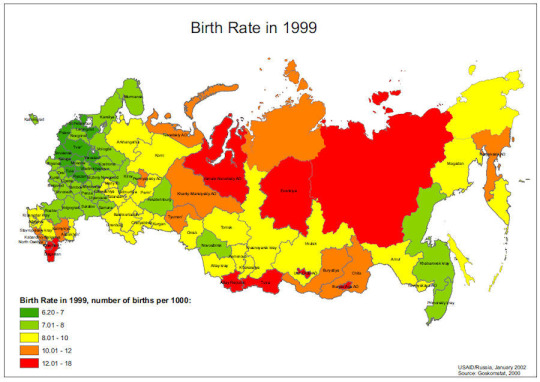
In case anyone is wondering why ethnic minorities are overrepresented in the Russian military (and ongoing mobilization). The 20-30 year olds of European descent simply don't exist
via @sasha_trub
114 notes
·
View notes
Text
"If population growth didn't slow down, food shortages could be created in a hurry."
In 1969, ex-Planned Parenthood Medical Director Richard Day Prophesied How the Globalist Agendas Would Unfold

youtube
:
Via Sage :
#Richard Day#day tapes#planned parenthood#war on humanity#Youtube#birth rate#population control#eugenics
5 notes
·
View notes
Text
Chinese men: “Why aren’t women having kids?” Chinese women: “Aren’t we getting poorer with each child we have?”
28-year-old Joy Yu’s parents each had three siblings. As they were growing up in the 1970s, the Chinese government started to limit the number of babies born.
Government statistics show on average a woman in China went from having about three babies in the late 1970s to just one.
Four decades on, China’s leaders are asking women to have three children again, which doesn’t sit well for Yu, an only child.
“For me to give birth to three children, my future husband must be rich enough to make sure I can live well without a job. This is a big challenge,” Yu said.
Last year, China’s population dropped for the first time in six decades by 850,000. That still leaves the country with 1.41 billion people but if the decline continues, there will be multiple impacts on the economy.
One-child policy
China began enforcing birth limits in the late 1970s when the country was poor and there were too many mouths to feed.
In a Chinese propaganda film called the Disturbance of Gan Quan Village, the birth restrictions were justified on economic grounds.
“We should put our energy into getting rich rather than keep having children,” says one woman in the film.
She’s sitting among a group of women picking corn kernels off the cob. “Aren’t we getting poorer with each child we have,” she says. The rest of the group nods in agreement.
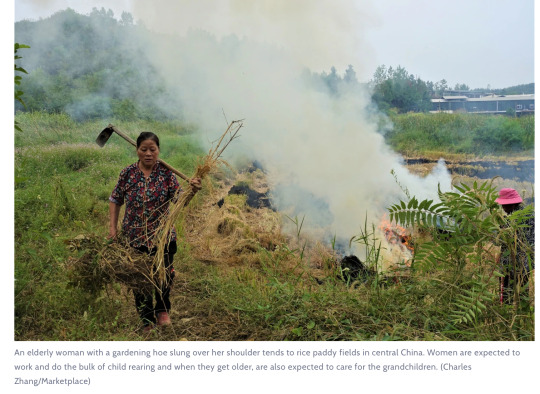
Chinese leaders enforced, sometimes brutally, the so-called one-child policy in 1979, just as the country was coming out of the tumultuous Cultural Revolution.
“The post-[Chairman] Mao leadership thought that economic development would be the new basis for the party’s political legitimacy and based on pseudo-scientific and demographic projections, limiting birth to one child per married heterosexual couple,” said Yun Zhou, an assistant professor of sociology at the University of Michigan.
There were exceptions. Some ethnic minority groups could have up to three children. People from rural areas could try for a second child if their first-born was not a boy. Later, if both parents had no siblings they could have two children. Starting in 2016, China raised the birth limit for everyone to two children, but there was no sustained baby bump.
Obstacles
Yu said she had opportunities her parents never had because she grew up without siblings. She attended one of China’s top colleges and her parents are able to help her with a down payment on a pricey property in Shanghai if she so desires.
Still, Yu said over an Italian meal in Shanghai, she is not even sure she wants to get married or have children.
Raising children in China is expensive. Also, the work of raising children, like in many countries, falls disproportionately on women. Those demands would be hard to juggle with China’s long work hours. A six-day work week is standard in many sectors.
Other people have complained of being penalized in the workplace for being mothers.
“Women are being forced back to the home to increase births. It is like my body isn’t mine.”
Only-child, Joy Yu
Global impact
Fewer people might mean slower growth in China, which will be felt by the U.S. and beyond.
“They’ve now become, you know, the center of the global manufacturing superhighway and are typically the largest contributor to growth every year,” said Scott Kennedy with the Center for Strategic and International Studies in Washington D.C.
Chinese officials often credit the so-called one-child policy for preventing over 400 million births, but some analysts say China’s population would have declined regardless.
“It’s just simply a rule across all countries, that as you urbanize, and as you get a more educated female population that enters the workforce, fertility numbers fall,” Kennedy said.

China’s birth restrictions merely sped up that trend and made the fertility rate drop dramatically and unevenly. The traditional preference for boys in Chinese families combined with the birth limits and ease of access to abortion has led to a massive gender imbalance.
Chinese government statistics show in 2020 for every 100 women there are 105 men, whereas the global ratio is one-to-one.
Attempted incentives
To encourage more births, the Chinese government has dangled a mix of carrots and sticks — cash incentives, tax breaks, pledging to lower the cost of children’s education, and making it harder for couples to divorce.
“Now, the government organizes matchmaking events, and it’s a mission just like when it enforced the one-child policy. This is so terrifying,” Yu said. “Women are being forced back to the home to increase births. It is like my body isn’t mine.”
A backdrop of gendered violence
Sometimes, the government is asked to step in, but officials are instead accused of a cover up.
For example, when a woman was found chained up in a far-flung village after having given birth to eight children, it triggered a discussion on human trafficking. But efforts by local journalists and concerned citizens to verify the details of this woman’s life independently have been repeatedly blocked by local officials. That includes an attempt by pioneering lawyer Li Zhuang earlier this year. He wrote a post about the difficulties he encountered, which was later deleted.
In northern China’s Tangshan city, a group of men savagely beat some women at a restaurant. The incident provoked a public outcry and while officials have punished the men and dismissed some police officers, the women have not been seen in public since. Officials were accused of suppressing the discussion about violence against women.
Even women in wealthy cities like Shanghai said they could identify with the victims in the reports.
“Those reports encapsulate a sense of gendered precarity that speaks to women in [a] deeply patriarchal and gender unequal society,” social demographer Zhou said.
Economic costs
The number of Chinese workers is already declining; according to the World Bank, in 2001, China had 10 workers to support one retiree.
“In 2020, that was down to five working folks for each retiree and by 2050 it’ll be down to two,” Kennedy said.
He believes China still has time to offset the effects of population decline, including by boosting productivity, increasing the retirement age and lifting restrictions on people from rural areas to freely settle in cities with their families.
“I don’t think the problem has become so severe that demography is destiny, and China is destined to radically slow down and its chances of becoming an economic superpower breaking out of the middle income trap have been dashed,” Kennedy said.
“[But] these are pretty significant challenges.”
#China#birth rate#One child policy#Educated women and birth rates#Men bitching about less births without doing anything to make it easier on women to have babies#Maybe start having parenting classes for men
9 notes
·
View notes
Video
Low Birth Rates: USA🇺🇸 v. Germany🇩🇪
#video#tiktok#tiktoks#politics#usa#united states#united states of america#germany#birth control#birth rate#birth rates#funny#lmao#wtf#mom#moms#mother#mothers#usa.mom.in.germany
41 notes
·
View notes
Text
"Genetic deterioration through man-made agents is the menace of our time, 'the last and greatest danger to our civilization'."
- Silent Spring by Rachel Carson
#silent spring#rachel carson#environmetalists#environmentalism#science communication#science#birth rate#fertility
17 notes
·
View notes